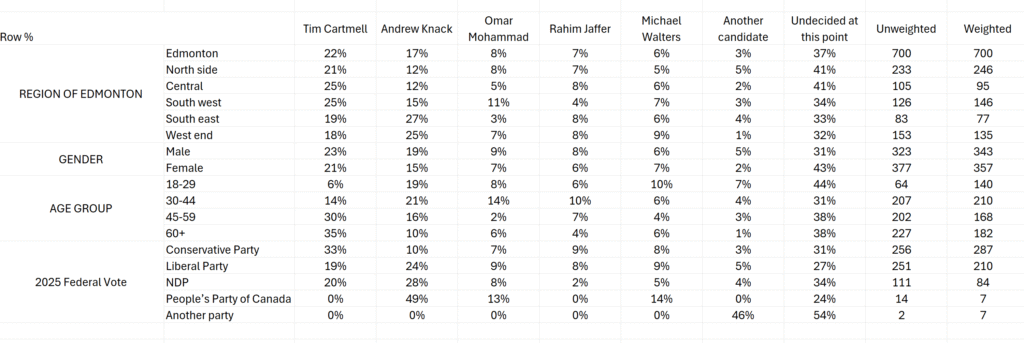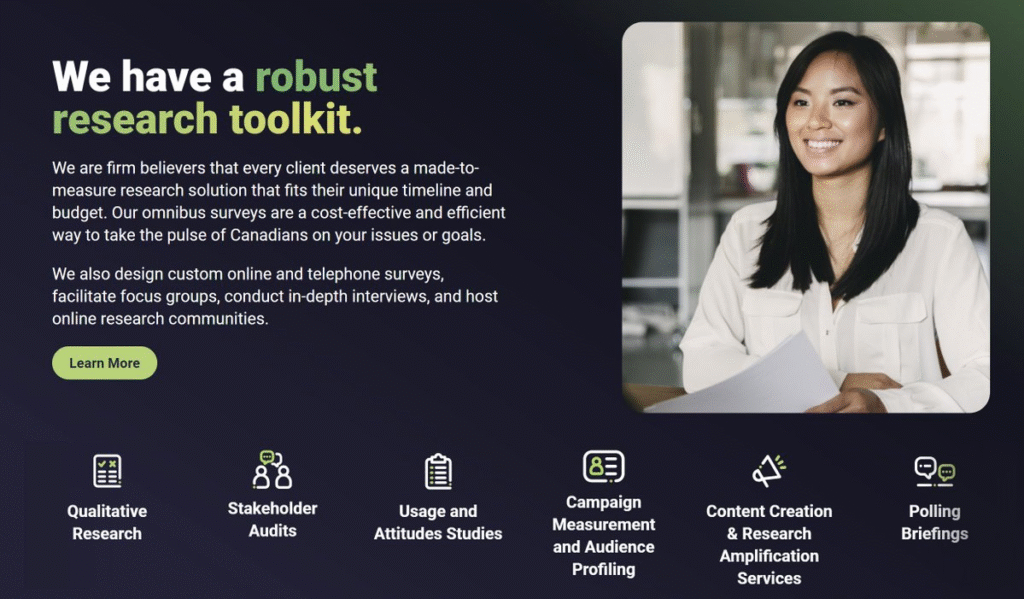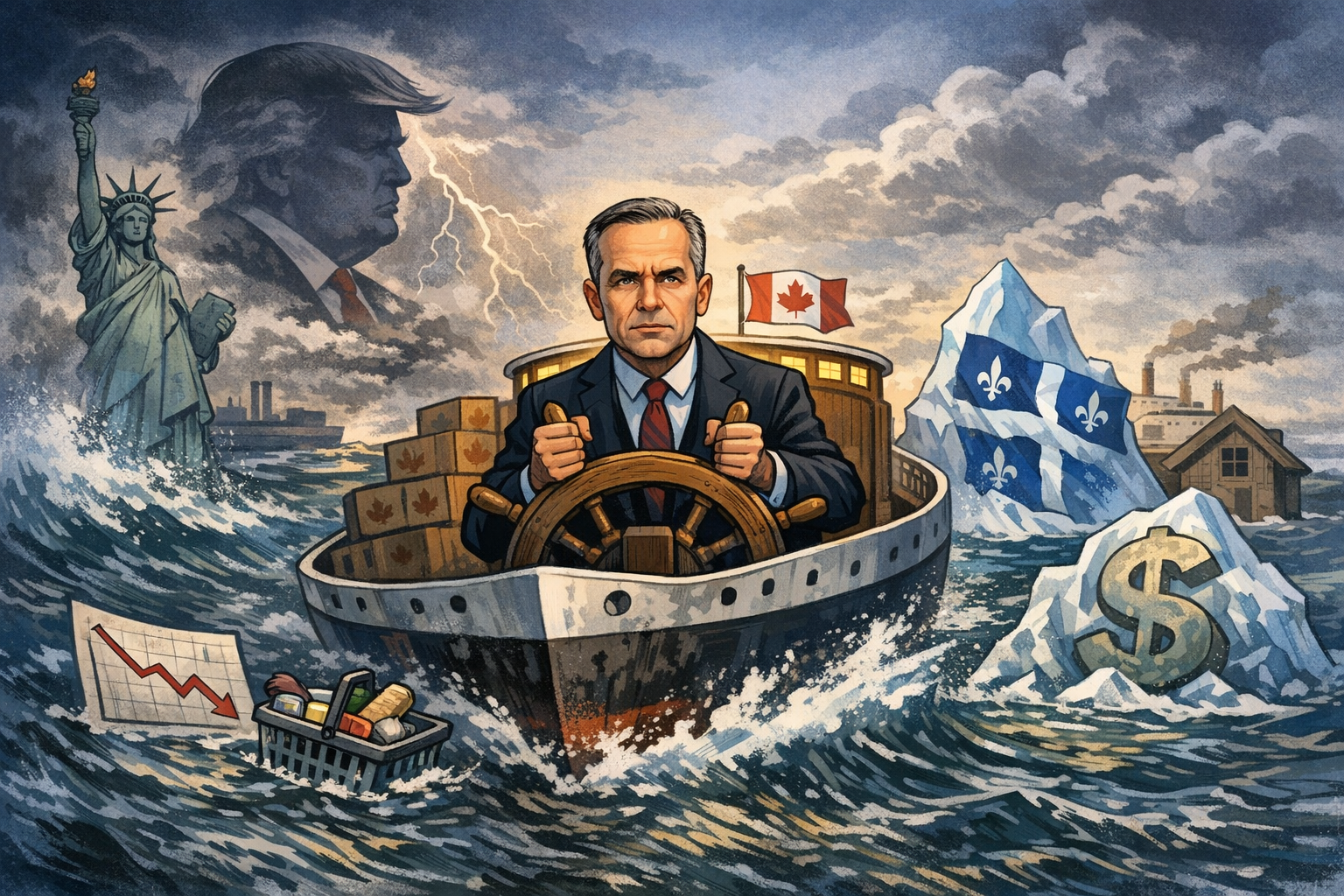Abacus Data Poll: Edmonton Voters Focused on Stability and Affordability as Mayoral Race Heats Up
October 3, 2025
Cartmell leads, but many remain undecided. Public split on taxes, frustrated with homelessness and crime.
From September 25 to 29, 2025, Abacus Data surveyed 700 eligible voters in Edmonton to assess public opinion heading into the final stretch of the city’s mayoral campaign. The data paints a picture of an unsettled electorate with significant anxiety about affordability, homelessness, and public safety. While Tim Cartmell leads among likely voters, the race remains wide open, with nearly 4 in 10 still undecided.
Key dynamics shaping the election include a strong desire for stable, competent leadership, divisions on tax policy, and the polarizing presence of Premier Danielle Smith — whose role in the campaign appears to be motivating voters in different ways.
Direction of the City: Mood Leans Negative
Edmontonians remain more negative than positive about the direction of their city. Only 34% believe the city is headed in the right direction, while 49% think it’s off on the wrong track. Another 17% aren’t sure.
Perceptions vary by region and demographic. Those on the South East side of the city (68%) and older Edmontonians (51%) are most likely to say the city is off course. Men (56%) are more negative than women (43%), and UCP voters are especially pessimistic (63% off-track).

Top Local Issues: Housing, Homelessness, and Crime Dominate
Voters were asked to identify their top three local priorities. The results point clearly to a sense of urgency around affordability and basic public order:
- Housing affordability and accessibility: 47%
- Poverty and homelessness: 45%
- Crime and community safety: 42%
- Municipal taxes and fees: 38%
- Traffic and road maintenance: 33%
Other issues like drug use, core services, and the economy follow behind.

While housing affordability and homelessness rank at or near the top for both Cartmell and Knack voters, the two coalitions diverge meaningfully on what comes next. Cartmell’s supporters place heavier emphasis on municipal taxes and fees (51% rank it a top-three issue) and traffic and road maintenance (37%) — issues tied to fiscal control and core city functions.
Knack’s voters, by contrast, lean more strongly toward protecting and expanding public services, ranking core services like transit and garbage pickup (35%) and the local economy and jobs (30%) higher than taxes. Both groups rate crime and community safety as a top concern (40% among Cartmell voters, 44% among Knack voters), underscoring that public safety is a cross-cutting anxiety. These differences suggest the two leading candidates are drawing from distinct but overlapping voter pools, with Cartmell appealing to those focused on discipline and cost control and Knack resonating more with those prioritizing social investment and service protection.


How Voters Are Thinking About the Election
To better understand voter motivations, we tested a series of paired statements that frame the election in different ways — from stability vs. disruption to investment vs. restraint.
The clearest finding: the largest groups of voters are looking for steady, competent leadership that can bring order and control to a city they see as drifting.
71% of voters say they want a mayor who will provide steady, reliable leadership — these voters break 23% for Cartmell and 18% for Knack.
29% say they want a mayor who will shake things up — a more divided group, with Cartmell ahead of Knack by 7 among this group but with undecideds much higher.
On fiscal issues, voters are divided:
55% say their vote is about keeping taxes low — Cartmell leads strongly with 28% to 13% for Knack.
45% say it’s about making sure city services are funded — these voters lean toward Knack (22%) compared with 14% for Cartmell.
When asked which statement reflects their view on housing more:
57% want to build more housing faster — Cartmell and Knack are tied among this group.
43% prefer to slow growth and preserve neighbourhood character — this group leans clearly towards Cartmell (23% to 12% for Knack).

Homelessness, Crime, and the Precarity Lens
When it comes to social disorder and encampments:
69% want to invest in long-term solutions like housing and social supports — Knack is competitive here, but Cartmell still draws support from 22%.
31% of voters say their vote is about cracking down on disorder — Cartmell leads among these voters (22%) to 13% for Knack.
This reflects a broader trend we’ve observed across the country: a rising “precarity mindset” among voters. More and more, people are looking for leadership that restores stability — whether through tough enforcement or systemic investment.

Danielle Smith’s Role in the Campaign
The Premier is a background but influential figure in the election.
Half of Edmonton voters (50%) say their vote is more about sending a message to Danielle Smith and the UCP than finding someone who can work with her. The other half say they want a mayor who will work better with the provincial government.
Knack draws more support from those wanting to send a message to the Premier. Among that group, 20% plan to vote for him. Cartmell is more competitive among those looking for provincial cooperation (27%).
This dynamic could shape the final weeks of the race, especially if Knack consolidates more progressive voters.
Tax Freeze Debate: Public Split
When asked whether a promise to freeze or cut property taxes is credible:
- 51% say it’s realistic and credible if priorities are managed.
- 49% say it’s just a promise to get votes and not realistic given the city’s financial situation.
Among Cartmell voters, 56% say such promises are realistic. Among Knack voters, 56% say they aren’t. This divide could reinforce campaign messaging on both sides — with Cartmell appealing to restraint and fiscal control, and Knack emphasizing investment in services.

Candidate and Party Leader Impressions
When we ask how people feel about the major candidates and the current and past provincial party leaders, none of the leading candidates are particularly polarizing.
Both Tim Cartmell and Andrew Knack have more positive than negative impressions — Cartmell holds a +25 net favourability score (35% positive vs. 10% negative), while Knack is at +18 (31% vs. 13%). Importantly, negative views of both men are low, suggesting neither is viewed as a threat or lightning rod by the broader electorate at this point.
This leaves room for the campaign to be decided on issues and leadership perceptions rather than personal baggage.
In contrast, Premier Danielle Smith stands out as the most polarizing figure tested, with a -21 net score (25% positive vs. 46% negative). While she’s not a candidate in the race, her presence looms large reinforcing her potential as a motivator for voters who want to send a message to the provincial government, and a reminder that provincial politics are very much in the background of this municipal campaign.

Vote Intention: Cartmell Leads Among Likely Voters
If the election were held today Tim Cartmell leads with 39% of decided likely voters. Andrew Knack is second at 28%. Other candidates — Omar Mohammad, Rahim Jaffer, and Michael Walters — are tied at 9%. 30% of likely voters remain undecided.
Among all eligible voters, Cartmell leads with 22%, Knack is at 17%, and 37% remain undecided — underlining just how open the race remains.

Demographic Trends: Cartmell Stronger with Older Voters
Cartmell leads by a wide margin among those aged 45+ (33% vs. Knack’s 13%).
Knack is slightly ahead among younger voters (20% vs. Cartmell’s 11%).
Vote intentions also reflect partisan leanings: Cartmell leads among UCP and Conservative voters (31–33%). Knack is strongest among NDP and Liberal supporters (28% and 24%).


The Upshot
According to Abacus Data CEO David Coletto:
“This election for Edmonton mayor remains wide open. Tim Cartmell has a lead — especially among older voters and those craving stability — but a large number of Edmontonians are undecided. The public is focused on serious concerns like housing, homelessness, and public safety, and they’re looking for realistic, credible leadership to get things under control.
The election is taking place in a broader climate of precarity, where people feel the city is losing control. The candidate who can best reassure voters — through competence, calm, or reform — is likely to win.
Premier Danielle Smith is also casting a long shadow over the race, with half of voters saying their ballot is a way to send a message. That creates opportunity for progressives, but only if they can consolidate around a single candidate. With three weeks to go, a lot can still change.”
Methodology
The survey was conducted with 700 adults (18+) eligible to vote in Edmonton from September 25 to 29, 2025.
A random sample of panelists were invited to complete the survey from a set of partner panels based on the Lucid exchange platform. These partners are typically double opt-in survey panels, blended to manage out potential skews in the data from a single source.
The margin of error for a comparable probability-based random sample of the same size is +/- 3.8%, 19 times out of 20.
The data were weighted according to census data to ensure the sample matched Edmonton’s population by age, gender, educational attainment, and region. Totals may not add up to 100 due to rounding.
The survey was paid for by Abacus Data Inc.
Weighted and Unweighted Case Numbers and Results (All Eligible Voters)


ABOUT ABACUS DATA
We are Canada’s most sought-after, influential, and impactful polling and market research firm. We are hired by many of North America’s most respected and influential brands and organizations.
We use the latest technology, sound science, and deep experience to generate top-flight research-based advice to our clients. We offer global research capacity with a strong focus on customer service, attention to detail, and exceptional value.
And we are growing throughout all parts of Canada and the United States and have capacity for new clients who want high quality research insights with enlightened hospitality.
Our record speaks for itself: we were one of the most accurate pollsters conducting research during the 2025 Canadian election following up on our outstanding record in the 2021, 2019, 2015, and 2011 federal elections.
Contact us with any questions.
Find out more about how we can help your organization by downloading our corporate profile and service offering.



